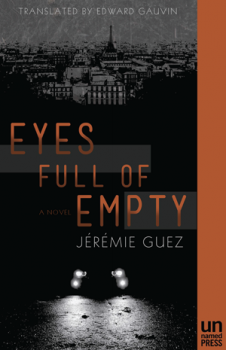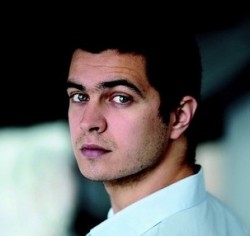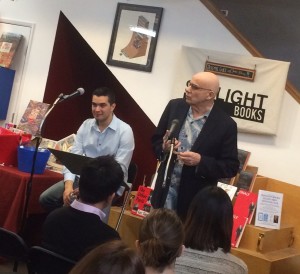International Thrills: An interview with Jérémie Guez
A New and Unflinching Voice in French Noir
 By Layton Green
By Layton Green
“You want me to tell you what’s sad? Sad is when you believed in things, when you backed a man who turned out to be the wrong horse, when you wanted a career and wound up with a guy who makes a living taking out other people’s trash, getting philosophical over a beer on a weekday night.” — Jérémie Guez, EYES FULL OF EMPTY
I wasn’t sure what to expect when I agreed to interview a 26-year-old novelist hailed as the “rising star of contemporary French noir.” I was pretty sure his work would be exciting and brilliant. I just wasn’t certain what French noir meant. Camus meets Chandler? A Proust-spouting tough guy?
Turns out Jérémie Guez’s EYES FULL OF EMPTY invokes all of those things. A touch of world-weary philosophy, a nod to the greats, a moody Parisian setting. Yet EYES FULL OF EMPTY carves out its own place in the crime fiction canon. It features Idir, an at times frustrating but always compelling anti-hero, a P.I., and a second-generation Algerian immigrant who uneasily roams the vast limbo between the Parisian upper crest and the criminal underclass. I’ve never run across a character quite like him, and he made an indelible impression.
I’ll let Jérémie tell you a bit more about himself, Idir, and EYES FULL OF EMPTY:
Thanks for taking the time to chat, and for creating a great work of fiction. I have lots of thoughts on the novel, but let’s start with your impressive career–tell us about your journey to become a novelist.
Thank you! Well I was finishing my studies and working shit jobs. I had an unfinished manuscript in my drawer. I polished it, went to the post office, and sent it to a publisher. I was very lucky.
Can you talk a bit about your background, and how it might influence your work?
I know very well the city where I live, I’ve met a lot of people in my life with very different situations. I just observe. And write.
You’re often described as a noir writer, as well as an author writing in the legacy of Camus– how do you describe your literary roots? (I noticed the inclusion of Oscar “Crumley” as a character . . .)
My literary roots are mainly Americans. So many names. It’s hard to quote everybody. Ellroy, Bunker, Burke, Price… You’ve noticed Crumley, it was a big influence for this book because what he writes is funny and desperate at the same time. Beautiful.
Tell us about the hard-boiled noir genre in France, and if/how it differs from that of the U.S.
It used to be a political genre in France, and it pissed me off when I was a kid. I mean, who are you to tell readers who they have to vote for? Fiction is fiction, nothing more. That’s why I was only reading U.S. hard-boiled writers when I was young. They were storytellers–and it seemed true. I knew people like their characters. David Goodis wrote beautiful stuff about addiction, alcohol… And it’s very simple. As if an alcoholic was explaining with his own words what he was suffering from.
But things have changed in France. We’re influenced a lot by what you guys do.
What modern French crime writers do you admire? U.S. (or other international) writers?
He’s not a crime writer, but I love Jerome Ferrari. He wrote a very beautiful book about war in Algeria. Concerning U.S. writers, I love James Ellroy, Pete Dexter, James Lee Burke, Richard Price, Don Winslow… I love a lot of U.S. writers.
To me, EYES FULL OF EMPTY was noir on two levels: the protagonist, Idir, a small-time private detective of sorts, is hard-boiled compared to most of his family and friends, and to his clients. However, he is soft-boiled in comparison to the real criminals, and he also suffers from bouts of uncontrollable sobbing. I loved the juxtaposition of the two worlds, and I think there are lots of reasons why you chose this premise, but can you discuss your decision to flip the noir genre on its head?
Oh, yes, you’re right. I thought he was the perfect character to describe this big fucked up city and the people who live there. He’s stuck between two worlds. Between the rich and the poor. He’s impartial. He has no family. That’s why he’s a hero. He’s on his own… and he’s free.
Would you like to comment on Idir’s crying jags, or would you prefer to leave that to reader interpretation?
Oh, he’s just fucking depressed. And there’s a character who never cries in a very famous French book. I don’t want to say his name. But Idir is the opposite of this character.
In the novel, there is a good bit of focus on class relations and cultural divides in modern Paris. Is this a theme of your other work?
Yes! It’s very important. I’m not a sociologist, you know. Gentrification happens everywhere. In London, in New York… But I live in Paris. This is where I grew up. So I don’t want anything global. I want something specific. I want to describe those people, those communities, the specific details.
Idir is a wonderfully complex character, and in some ways, he is very disagreeable. He whines. He constantly blames others for his problems. He has squandered his opportunities. Yet I really cared about him by the end of the novel, which I think is a fantastic achievement–you made me like the unlikable, and ponder my decision to do so. Is it fair to say that was your intent? Is Idir indicative of your other protagonists?
Yes, he keeps whining again and again. He’s a pain in the ass. That’s why he’s good at what he does. He’s not an alpha male. He’s a loser.
Is there anything else would you like to tell us about EYES FULL OF EMPTY? Did you have any unusual difficulties writing it? Comic or tragic stories related thereto?
I always have unusual difficulties writing novels so… no, nothing special. The comic elements come from many locations and people that exist in real life…
I’ll pass on a question I ask authors from time to time: W. Somerset Maugham famously once said, “There are three rules for writing the novel. Unfortunately, no one knows what they are.” Do you agree or disagree, and why?
Disagree. There is only one rule, and fortunately we all know it. The rule is: There are no rules.
Creative process question: Do you write comprehensive outlines, or start writing and see how the story develops?
I try to write comprehensive outlines. Without that, I’m really lost.
Do you have any advice for up-and-coming writers?
Work like a coal miner.
What you are working on now?
A few things… But I’m really superstitious, so I can’t talk about it!
*****
 Jérémie’s two previous novels, BALANCÉ DANS LE CORDES and PARIS LA UNITY, were awarded the 2013 SNCF du Polar and 2012 Plume Libre prizes, respectively. EYES FULL OF EMPTY is the first English translation of Jérémie Guez’s work, and the third novel in his Parisian trilogy. Jérémie is on tour in the U.S. this fall, including a stop with Cara Black.
Jérémie’s two previous novels, BALANCÉ DANS LE CORDES and PARIS LA UNITY, were awarded the 2013 SNCF du Polar and 2012 Plume Libre prizes, respectively. EYES FULL OF EMPTY is the first English translation of Jérémie Guez’s work, and the third novel in his Parisian trilogy. Jérémie is on tour in the U.S. this fall, including a stop with Cara Black.
To learn more about Jérémie, please visit his website.
- International Thrills: James Wolff - June 30, 2018
- International Thrills: Sara Blaedel - April 30, 2018
- International Thrills: Ramón Díaz Eterovic - November 30, 2017

